Five Dead In Hostage Taking Incident In Iran
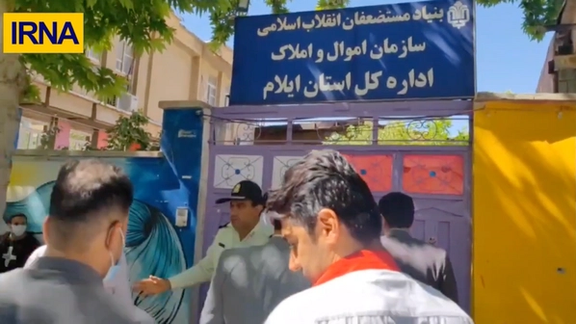
A former employee of Iran’s charitable Mostazafan Foundation killed three of his former coworkers on Wednesday before killing himself in a hostage taking in the western Iranian city of Ilam.

A former employee of Iran’s charitable Mostazafan Foundation killed three of his former coworkers on Wednesday before killing himself in a hostage taking in the western Iranian city of Ilam.
According to local police, seven other people were injured in the incident, some of whom are in critical conditions. One of them succumbed to his injuries at the hospital.
Fars news agency said that following a verbal argument with the employees of the Property and Real Estate Department of the Mostazafan Foundation of Islamic Revolution, the former employee took a gun from his car, and held several of his colleagues at gunpoint before he started a shooting spree on the premises.
According to unconfirmed reports, the hostage taker threw a grenade inside one of the rooms of the office.
No details about the identity or motive of the hostage taker were released, and local police authorities say the incident is under investigation.
Bonyad-e Mostazafan in the Islamic Republic’s second-largest commercial enterprise that is behind the state-owned National Iranian Oil Company. It is reportedly the biggest holding company in the Middle East.
The bonyad is associated with the Islamic Revolutionary Guard Corps where some of its head officials have come from.
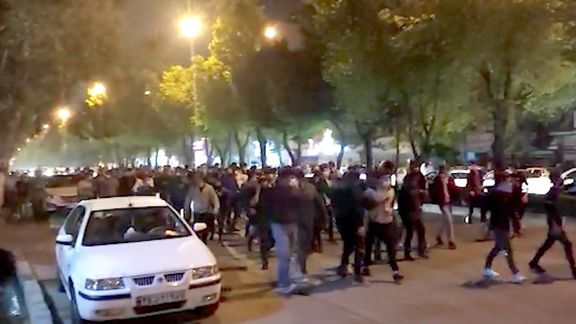
Five hundred Iranian political and civil activists and Amnesty International in separate statements Tuesday warned about the government’s heavy-handed suppression of protesters.
The activists in their statement urged the government of President Ebrahim Raisi to adopt a fundamental solution to the problems that the country is currently grappling with, particularly the issue of soaring prices and very high inflation, and to reform faulty structures and change policies while showing tolerance towards protesters.
Activists also warned that suppression of protests and arresting protesters would only make the situation worse and add fuel to the fire.
Protests that began in the southwestern province of Khuzestan over a week ago triggered by a sudden jump in food prices have spread to other provinces and have continued, mainly in smaller towns. The protests have quickly taken an anti-government tone and protesters often chant slogans against authorities, including the supreme leader, the president, and the ruling clerics. In some instances, protesters have attacked local headquarters of the Basij militia of the Revolutionary Guards (IRGC) whose members are often deployed to suppress protesters.
In larger cities such as the capital Tehran, Mashhad, Zanjan and Shiraz security forces have displayed a heavy presence on the streets, creating an atmosphere of fear and apprehension.
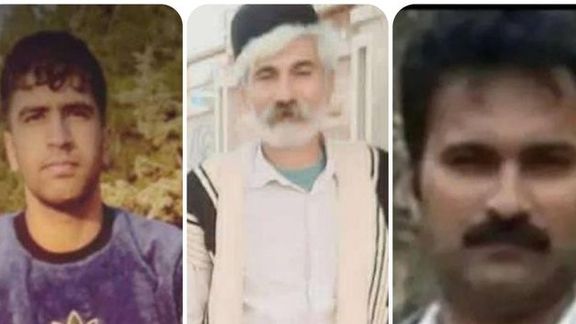
So far at least six protesters have been shot, in the head or chest, by security forces in western provinces of Khuzestan as well as Chahar Mahal and Bakhtiari and around one hundred have been arrested in various cities.
The global human rights watchdog, Amnesty International, also said in a statement Tuesday that it is the human right of people in Iran to "organize and take part in peaceful protests free from intimidation, violence and threats of arbitrary arrest, torture and unjust prosecution”. Amnesty urged Iran’s Supreme Leader Ali Khamenei to “rein in security forces to prevent further bloodshed.”
Amnesty also said access to the internet is essential to protect human rights, especially during protests. “Iran’s authorities must stop the pattern of internet shutdowns used to silence people in Iran and cover their human rights violations, including by security forces.”
The global rights watchdog also urged the international community, including the UN Human Rights Council states, to pressure the Iranian authorities to stop the recurrent pattern of using lethal force and pursue accountability through an independent UN mechanism.
In exclusive comments to Iran International on Monday, a US spokesman also condemned the use of violence by security forces against protesters and supported their right to peaceful assembly. “We are witnessing brave Iranian protestors demand that their government address their concerns amid rising commodity prices and water and electricity shortages. We have also seen deeply disturbing reports of security forces firing on protesters. Again, we condemn the use of violence against peaceful protestors,” he said.
The spokesman also condemned the disruption of internet services in many cities and towns by the government who wants to prevent news reaching the world about the protests and the violence used against unarmed citizens.
Monday evening a young man, Jamshid Mokhtari, was shot dead by security forces in Jouneghan, a small town in Chahar Mahal and Bakhtiari province. Social media reports Tuesday said the Internet had completely shut down in Jouneghan and security forces were shooting at protesters.
More Protests were reported in Golpayegan in the central province of Esfahan Tuesday where people took to the streets for the first time.
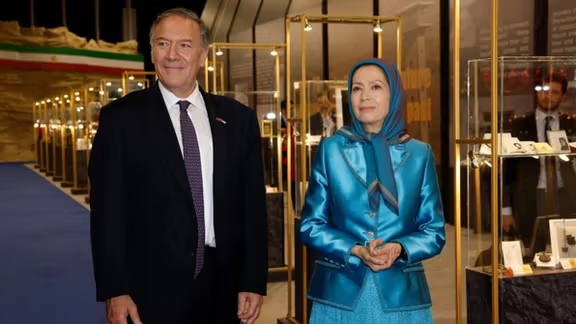
Mike Pompeo, United States Secretary of State under President Donald Trump, has visited the camp in Albania of the Iranian Mujahedin-e Khalq (MEK).
“In the end the Iranian people will have a secular, democratic, non-nuclear republic, I pray that this day will come soon,” Pompeo said during his controversial visit Monday. “I am committed to this cause; I know you all are too.” Pompeo met with the MEK leader Maryam Rajavi, describing her as “president-elect” of Iran.
Some Iranian dissidents have criticized Pompeo’s visit to the MEK center in Albania, as they regard the organization as non-democratic.
Pompeo, secretary of state when the US in 2018 left the 2015 Iran nuclear deal and imposed ‘maximum pressure’ sanctions, Monday called Iranian president Ebrahim Raisi a “butcher” who had “orchestrated” prison executions in 1988. Pompeo claimed 30,000 prisoners had been executed, the majority of whom “were the MEK.”
The Islamic Republic holds the MEK responsible for bombings in Iran in 1980s and for its alliance with Saddam Hussein until his overthrow in 2003. The United States relocated the opposition group from Iraq to Albania in 2013 as pro-Tehran Shiite groups were attacking the MEK and Kurds were demanding to hold the organization accountable for siding with Saddam.
Pompeo said that current “unrest in several Iranian cities, triggered by a sudden jump in prices,” showed Raisi had “failed” as president. “His mission is clear,” Pompeo said. “Inflict pain. Frighten, continue to loot and plunder.”
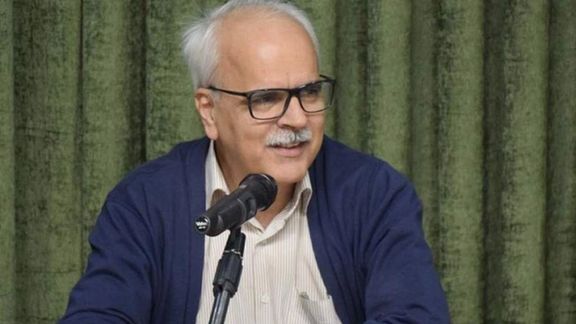
Prominent Iranian sociologist and former political prisoner Saeed Madani has been arrested on charges of "suspicious foreign connections" and “measures against the security” of the country.
Iran’s semi-official Mehr news agency reported Monday that he was arrested and sent to prison for meeting with suspicious foreign agents and conveying their intentions and operational strategies to some convicted agents inside the country.
The report did not provide any source or further details about the case against the scholar.
In January, he wrote to Chief Justice Gholamhossein Mohseni-Ejei after being denied exit from Iran to begin a one-year research post at Yale University.
He said he was stopped at an airport gate in December as he was about to board, adding that a Revolutionary Guards (IRGC) intelligence officer told him, without an explanation, that he was barred from leaving the country and kept Madani's passport.
Madani − whose research interests include poverty, drug addiction, child abuse, and prostitution − belongs to the banned Nationalist-Religious Alliance, a group of small non-violent religious opposition groups that favor political reform and welfare economics. He has been sentenced and imprisoned several times for membership in the group and for "propaganda against the state." In 2016, he was exiled to the southern port city of Bandar Abbas after four years of an eight-year prison sentence served at Evin prison, Tehran.
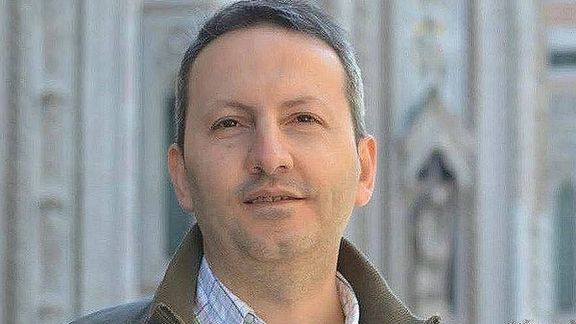
The United Nations human rights office urged Iran Tuesday to halt the execution of Swedish-Iranian academic Ahmadreza Djalali and rescind his death sentence.
The semi-official ISNA news agency had reported that Djalali (Jalali), a specialist in emergency medicine, would be executed by May 21 following his conviction for espionage in 2017. Human rights groups said his trial – by a Revolutionary Court, following his arrest in 2016 while visiting Iran on an invitation from a university – was unfair.
On Monday, Iranian Foreign Ministry Spokesman Saeed Khatibzadeh told a press conference that a request to postpone Djalali’s execution was under consideration and that the judiciary was “following up on this." Enrique Mora, the senior European Union official coordinating talks to revive the 2015 Iran nuclear agreement, said he had raised the case on his Tehran visit last week, requesting a stay of execution and Djalali’s release on humanitarian grounds.
There have been reports in recent weeks and months of Iran being in contact with both the United States and European states over potential prisoner swaps. Nazanin Zeghari-Ratcliffe, a British-Iranian citizen, was released last month after the British agreed to pay a long-standing £400-million (around $500 million) debt to Iran.
There has been speculation that the announcement of Djalali’s execution was intended to influence the trial in Sweden of Hamid Nouri, a former Iranian official, over his alleged role in a wave of prison executions in Iran in 1988. Tehran has said Djalali’s arrest and detention, a rare example of universal jurisdiction, are illegal.

Iran's state television on Tuesday showed a 3-minute report on the recent arrest of two French citizens, saying they were spies who had tried to stir up unrest.
Iran's intelligence ministry had said on May 11 it had arrested two Europeans for allegedly fomenting "insecurity" in Iran, but had not revealed their nationalities.
The arrest took place as the European Union chief nuclear negotiator Enrique Mora was visiting Tehran to revive the Vienna negotiations stalled since mid-March. Earlier Iran had threatened to execute a Sweidsh Iranian dual national arrested since 2016 and condemned to death on unproven charges of espionage for Israel.
Security detainees in Iran do not receive fair and open trials, with defense attorneys chosen by the government, and often left without pertinent information relating to their clients’cases.
France has condemned their detention as baseless and demanded the immediate release of the French couple, in an incident likely to complicate ties between Iran and Europe as the nuclear talks remain dormant. France, along with Germanu and the United Kingdom are participants in the nuclear talks.
On Tuesday, state television named the two as Cecile Kohler, 37, and her partner Jacques Paris, 69, adding that "the two spies intended to foment unrest in Iran by organising trade union protests". Iran's judiciary has yet to comment on the matter.
In Paris, there was no immediate response from the French Foreign Ministry to a request for comment on Iranian television's assertions, Reuters said.
In recent months, Iranian teachers across the country have staged protests demanding better wages and working conditions, as 40-percent inflation. Dozens of them have been arrested.
"They traveled to Iran as tourists ... But they took part in anti-government protests and met members of the so-called Teachers' Association," it said, showing Kohler and Paris apparently talking in a meeting with what it said were protesting Iranian teachers. An audio recording was released that seemed to be bits and pieces from undetermined conversation.
The TV footage showed what it said was their arrival at Tehran's International Imam Khomeini Airport on April 28 with Turkish Airlines from Turkey, as well as their arrest on their way to the airport on May 7.
Christophe Lalande, federal secretary of France's FNEC FP-FO education union, told Reuters on May 12 he suspected that one of his staffers and her husband were missing on a holiday in Iran.
Two other French nationals are held in Iran on national security charges their lawyers say are politically motivated.
Apparently, Mora intended to discuss the issue of foreigners held by Iran during his visit last week, but he did not mention the topic after his return.
Rights groups have accused Iran of trying to extract concessions from other countries through such arrests. Iran has repeatedly dismissed the chargé, but recently released two British Iranian detainees after London paid a $520million old debt.
Western powers have long demanded that Tehran free their citizens, who they say are political prisoners. The United States has acknowledged that the issue of de-facto hostages held by Iran has been discussed on the sidelines of the nuclear negotiations.